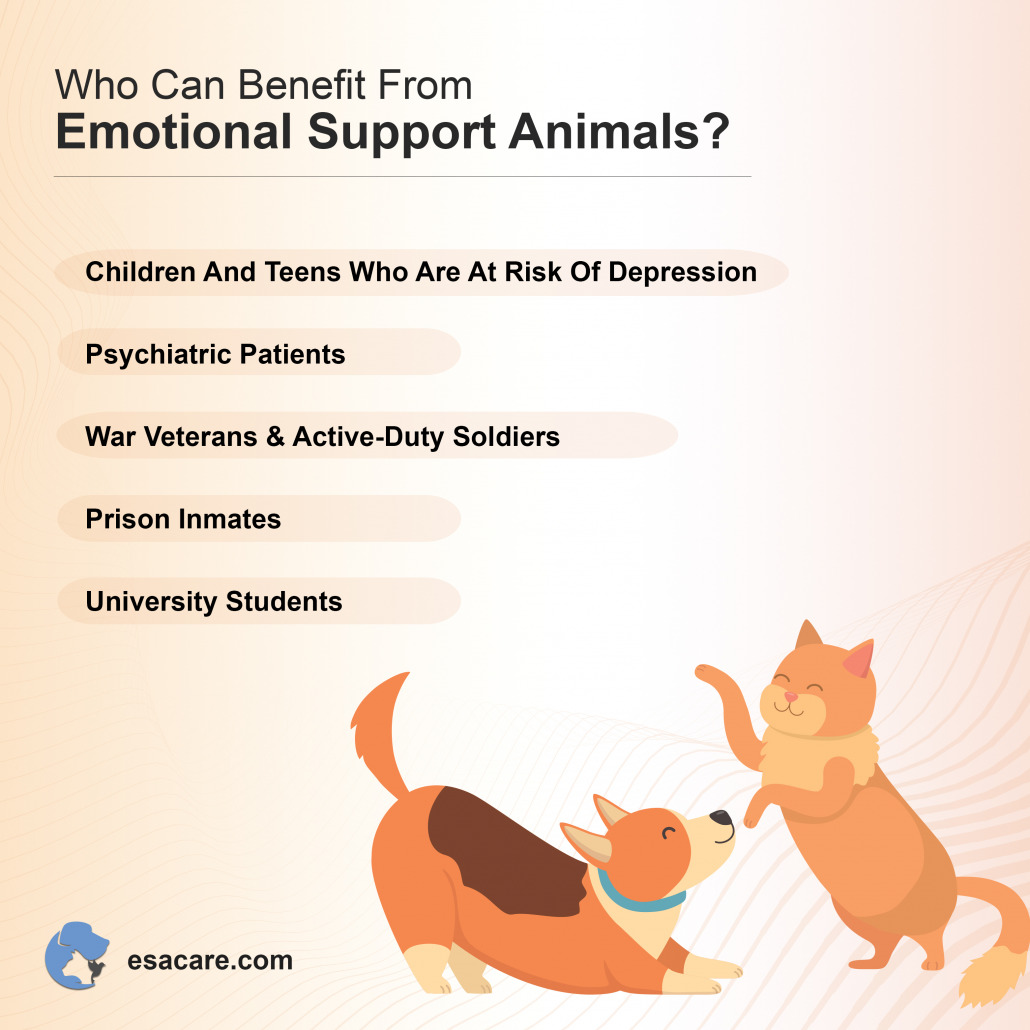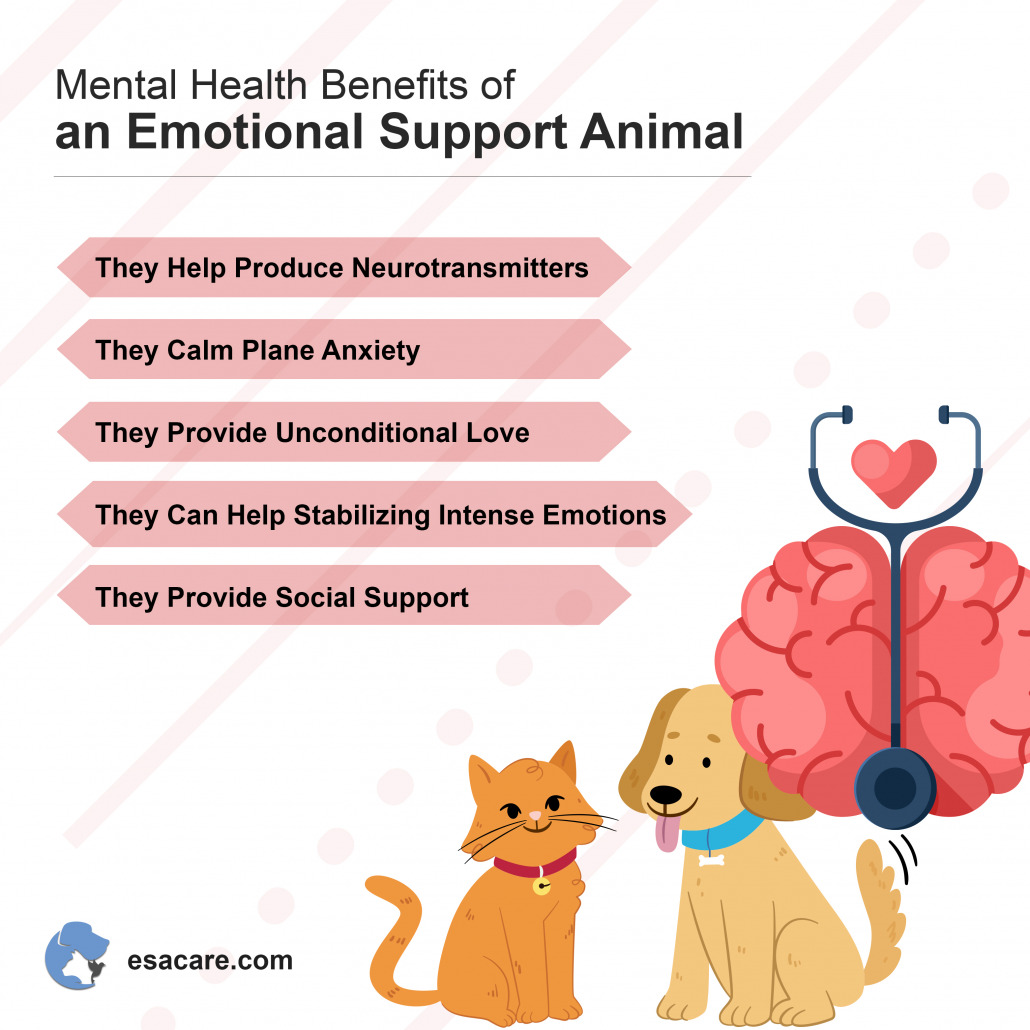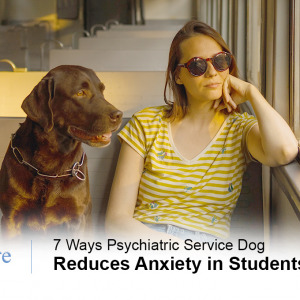Emotional Support Dog Information
What is an Emotional Support Dog?
All dogs are a source of companionship, comfort, and emotional connection for their owners. For those who struggle with mental illnesses or emotional disorders, emotional support from a dog may have a positive effect on their mental health. Emotional support dogs are not registered service animals, so they are not typically allowed in public areas such as restaurants or grocery stores. Emotional support dogs comfort their owners and help protect their mental health, but they are not typically trained to perform tasks that aid people with disabilities like service animals.
Improve your mental health by keeping your ESA pet close by – Get your ESA certification today!
What Disabilities Qualify for an Emotional Support Dog?
Social Anxiety Disorder
Most people occasionally feel self-conscious or uncomfortable when they are put in an unfamiliar social situation. A certain amount of social anxiety is normal and passes with time. For people with a social anxiety disorder (also called social phobia), the discomfort and stress that come with social situations can be overwhelming and too much to handle. The fear of feeling anxious or uncomfortable in public may lead these individuals to avoid social situations at all costs and even become reclusive. In extreme cases, it may become difficult to hold down a job or leave the house due to extreme social anxiety.

Benefit From Emotional Support Animals
General Anxiety Disorder
At some point in his or her life, everyone has experienced a certain level of anxiety or worry. People with Generalized Anxiety Disorder (GAD) experience excessive, persistent worry and anxiety about multiple aspects of life. Often, they will suffer from catastrophizing thinking, which is the “snowball effect” anticipating future problems to come and their development. Common areas of anxiety may include money, family or friends, work, or health but they can vary widely. A person with GAD will find that it is difficult or impossible to control their anxiety, even if they know that the situation does not warrant such extreme worry.
Depression
Formally known as Major Depressive Disorder, people who suffer from depression may feel an overwhelming sense of sadness, emptiness, or even lose interest in their lives. Being clinically depressed is much more serious than a normal bout of sadness, but is a mood disorder that may require long-term treatment or even medication. Symptoms will often flare up in episodes, where the person may experience hopelessness, reduced or extreme appetite, weight loss or gain, lack of energy, inability to get out of bed, body aches, lack of self-care, or even suicidal ideation. Often, the symptoms of a depressive episode are so intense that they will cause problems in the individual’s life, relationships, or work.
Panic Disorder
Suffering from a panic attack is so intense and terrifying, that it is often mistaken as a heart attack. People who suffer from panic disorder experience unprompted, unpredictable panic attacks with little to no warning. Along with the debilitating attacks themselves, individuals suffering from panic disorder also experience intense fear and dread of another one coming on. Panic disorder can make it very difficult for people to work steady jobs, drive cars, engage in social situations, or go in public. Since this disorder is not as widely publicized as some other anxiety or mood disorders, many sufferers don’t seek treatment for fear of being considered hypochondriacs.
Emotional support dogs for anxiety are really helpful. Travel around with your pet with an authentic ESA letter – Click the button below.
Postpartum Depression
Most people assume that the birth of a new baby is a purely joyful experience. Unfortunately, many new mothers actually experience some amount of the “baby blues” after the birth of their child. Symptoms may include trouble bonding with the baby, mood swings, crying anxiety, or other uneasiness. Often, these symptoms come along with feelings of guilt or inadequacy, which can make the episode worse. Typically, postpartum depression only lasts a few weeks after the baby is born, but can last longer in some instances.
Obsessive-Compulsive Disorder
People often mischaracterize Obsessive-Compulsive Disorder (OCD) as the desire for things to be orderly or having a habit. This may be partially true, but it is a serious disorder that can deeply hinder the life of those who suffer from it. Those with OCD suffer from obsessive thoughts; like that their spouse may get hurt or die. Often this is coupled with a compulsion, an action that is done uncontrollably to stop that event from happening. For example, a person with OCD may believe that stepping in and out of the shower exactly seven times will stop their spouse from getting hurt or dying. Often, these people know that their thoughts and behaviors don’t make sense, but they feel powerless against them and cannot stop.

Benefits of an Emotional Support Animals
Impulse-Control Disorder
Self-control is an important skill most people learn as they mature. That said, everyone splurges and shows a little impulsivity every now and then. Engaging in occasional impulsive behavior is normal, but some people lack the ability to control their impulses to the point where they put themselves or others in danger. There are five types of impulse-control disorders that are individually identified: kleptomania (stealing), pyromania (starting fires), intermittent explosive disorder (outbursts of anger/violence), pathological gambling, and trichotillomania (pulling body hair). People who suffer from these disorders continue to engage in problematic behaviors regardless of the consequences and cannot control their urges.
Phobias and Fears
Often, people refer to their strong fears of spiders, heights, or the dark as phobias. In reality, fears, even strong ones are normal and not considered to be life-altering or disordered. A phobia is an excessive, persistent fear of an object or situation that is long-lasting. A person with a phobia may go to great lengths to avoid the object of their fear and may experience trouble in their daily lives due to avoidance. Phobias can come in countless different forms and the symptoms experienced with facing the objects of one’s fear can be as extreme as inducing panic attacks or losing consciousness. Often, people will suffer from phobias of more than one situation or object.
Post-Traumatic Stress Disorder
Some people who have experienced deeply traumatic or terrifying events continue to suffer far after the event has passed. Those who suffer from Post-Traumatic Stress Disorder (PTSD) often experience flashbacks, nightmares or other sleep disturbances, obsessive thoughts, hypervigilance, or self-destructive behavior. Symptoms of PTSD may begin soon after the occurrence of the event, but can also develop years afterward. Those suffering from PTSD will often exhibit avoidance by refusing to think or talk about the event, or refusing to go to places that may trigger memories of it. PTSD can make living a regular life and holding a constant job incredibly difficult, and may sometimes include suicidal ideation.
Click the button below to keep your ESA Pet close to you.
Seasonal Affective Disorder
Some people struggle with emotional issues and depressive episodes primarily during the changing of the seasons. Seasonal Affective Disorder (SAD) is a type of depression that is directly related to the changing of the seasons, typically beginning and ending at the same time each year. It is most commonly experienced from the fall through the winter, but can also occur in the spring or summertime. Symptoms of SAD are similar to those of general depression and include appetite changes, sleep issues, and changing energy levels.
Get your Emotional Support Animal Letter today by booking an appointment at ESACare.










 347 5th Ave Suite 1402-112,
347 5th Ave Suite 1402-112,

Leave a Reply
Want to join the discussion?Feel free to contribute!